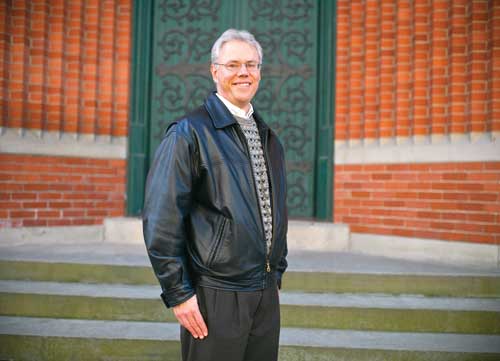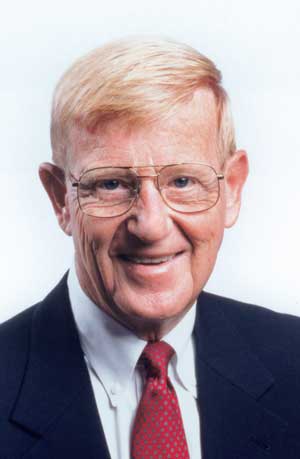In the Book of Matthew, Jesus tells his disciples that whatever is done to “the least of these” — the widow, the orphan, the sick, the hungry, the imprisoned — is done to Him, and Catholic Charities has taken that mission to heart for 100 years.

Catholic Charities Executive Director Rodney Schuster. Founded in 1914, the organization serves more than 40,000 people in Northwest Ohio each year. Toledo Free Press photo by Joseph Herr / Cover photo by Christie Materni
The nonprofit was founded in 1914, four years after Catholic Diocese of Toledo was formed.
“You cannot separate dealing with God from dealing with God’s people,” Diocesan Administrator Father Charles Ritter said. “From the Old Testament on, the measure of the uprightness of society was how you dealt with the widow, the orphan and the alien. The church has to be involved with those if it’s going to be authentically faithful to the message of Scripture.”
Today, Catholic Charities has expanded its focus to include jail and prison ministry, senior citizen care, disaster relief, crisis navigation, post-abortion support and more.
“To try to help change lives is — I don’t know if there can be anything more rewarding,” Catholic Charities Executive Director Rodney Schuster said. “It’s a real blessing for me.”
Catholic Charities has a budget of about $3.7 million, a staff of about 50 and more than 1,000 volunteers per year. It serves about 40,000 people per year, double the number served four years ago.
However, Schuster emphasized it’s the love behind each encounter not the number served that’s important.
“Our mission is we make real the love of God to anyone who comes to us,” Schuster said. “There’s still a perception out there we only serve people who are Catholic. In our ministries, we help anyone in need because we follow the example of Jesus and that’s what he did.”
Helping Hands of St. Louis in East Toledo serves about 300 meals per day and about 8,200 people receive hot meals and groceries each month in Toledo, Norwalk and Mansfield. About 40 people per night receive emergency and long-term shelter in Toledo and 10 per night in Norwalk. About 145 impoverished elderly are provided companionship and legal guardians in Erie, Huron, Ottawa and Richland counties.
Crisis navigator Linda Kraft spends two days a week at Helping Hands of St. Louis and the rest in Catholic Charities’ Downtown Toledo office taking calls.
“She’s just dynamite,” Schuster said. “She just listens to what’s going on in their life and helps identify barriers, helps provide a pathway to support services they might not know they could get. And most importantly follows up with them a couple weeks later.
“We just keep walking with them along the way until they get to a point where they are in a good spot,” Schuster said. “That’s really what ministry is.”
The focus is on helping people help themselves, Schuster said. For example, the 125 families on the verge of eviction who utilize the organization’s emergency rent program each has attend a 16-hour financial literacy program in exchange for the help.
“Ninety percent of the families we help stay in their homes because we give them the financial skills to manage their budget,” Schuster said.
Last year, the program was also offered pre-emptively to 50 families who had not yet reached the point of eviction, Schuster said.
Another program is Project Rachel, which offers a 24-hour hotline, counseling services and support to women who have had an abortion. Toledo was only the second diocese in the country to train its priests and counselors through Project Rachel.
“A lot of times people will say the Catholic Church is about rules and they don’t care about women. All you have to do is look at our devotion to Mary,” Schuster said. “We do care about women because abortion harms women and we’re there to say, ‘We wish you hadn’t, but you did.’ We’re never here saying we’re better than anyone else. We’re all sinners and we all make mistakes.”
Mercy and justice
While “works of mercy” was the focus of Catholic Charities for the first 50 years, the organization has been focusing more and more on “works of justice” as well, Ritter said.
“You feed the hungry and you deal with housing issues and you deal with orphans, but you also look at what are the social issues that end up creating the people in need,” Ritter said.
For the past year and a half, Catholic Charities has been working with Family House, Aurora Project and Bethany House through a strategic alliance partnership grant, exploring ways to reduce overhead cost, avoid duplication and possibly restructure some programs, Schuster said.
“A great example is the water crisis,” Schuster said. “We didn’t need a governmental agency. We were all on the phone that morning making sure everyone had food, water, paper products and whatever was needed so no one was going to be left in a situation where the people we are serving would be suffering. I think that’s beautiful.”
The future
As Catholic Charities moves into the next 100 years, Schuster said his two main hopes are that the organization can be more present across the 19 counties it serves and to attract more volunteers.
“There are many people that sit in churches every weekend wondering how they can help. One of our future roles and goals is to better engage people in volunteering,” Schuster said.
Many former recipients of aid now serve as volunteers or staff members, he said.
“We know that not everybody who comes to us is going to have a successful outcome, the ones that do we celebrate,” Schuster said. “That’s why we do this, one life at a time.”
Ritter said his hope for Catholic Charities is that it continues evolving in order to identify and meet the changing needs of the community.
“I hope they continue to not simply do good works — they do that and they do that well — but to help the broader church be more and more aware of the needs that are out there and get past some of the stereotypes we have about people who are in need,” Ritter said. “I think we have a great tradition of responding to genuine need when we know it’s there. We don’t always realize that it’s there.”
Anniversary Gala
A 100th Anniversary Gala on Sept. 18 will feature legendary University of Notre Dame football coach Lou Holtz.
“His talk is called ‘Game Plan for Success.’ He shares his story and background and things he’s learned,” said Catholic Charities Marketing and Communications Manager Andrea Slivka.
News anchor Jerry Anderson will serve as master of ceremonies for the event, which is set for 6:30 p.m. Sept. 18 at the Hilton Garden Inn in Perrysburg. Tickets are $150.
There will be dinner, complimentary wine, cash bar and a silent auction featuring Notre Dame tickets and sports memorabilia, autographed jerseys from the Detroit Red Wings and Pistons and more.
Catholic Charities has raised $400,000 so far toward its $1 million anniversary year fundraising goal.
“This will be a fun, festive event reflecting on 100 years,” Schuster said. “I hope attendees are inspired by his words to continue helping Catholic Charities as we move into the next 100 years.”
For more information, visit catholicchartiesnwo.org.























